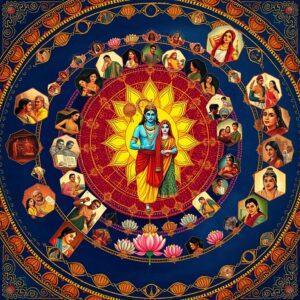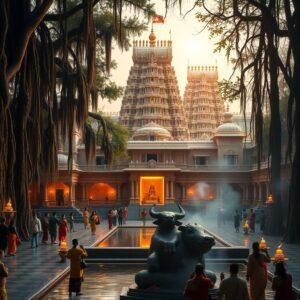
Karnataka, a state in southwestern India, is renowned for its abundant natural resources, rich cultural heritage, and historical significance. Often referred to as the “Land of Sandalwood and Gold,” Karnataka’s unique identity is shaped by its thriving sandalwood industry and gold mining activities.
Why Karnataka is Called the Land of Sandalwood
Karnataka has earned the nickname “Land of Sandalwood” because of its significant production of high-quality sandalwood. The state boasts major sandalwood forest reserves, particularly in Mysore and Shimoga. Karnataka sandalwood is known for its exceptional fragrance and oil content, making it highly sought after in the perfume and cosmetics industries. As a major region for sandalwood plantations, Karnataka has a rich heritage and tradition associated with sandalwood, often referred to as ‘Green Gold.’ The state is also famous for its exquisite sandalwood carving, which has a thousand-year history.
The history of sandalwood cultivation in Karnataka goes back centuries, to a time when it was used in religious rituals and traditional medicine. Karnataka Soaps and Detergents Limited (KSDL), established in 1916, is famous for producing Mysore Sandal Soap, globally recognized for its purity and quality. Mysuru, a city in Karnataka, is notable for selling various sandalwood products and is home to India’s first Sandalwood Museum.
The Karnataka government has implemented policies to protect and promote the sandalwood industry, ensuring sustainable harvesting and conservation. Karnataka’s sandalwood products are exported worldwide, contributing significantly to the state’s economy. Karnataka Tourism has also received the PATA Gold Award for its marketing campaign, which reflects their commitment to this valuable resource.
Why Karnataka is Called the Land of Gold
Karnataka is also known as the “Land of Gold” because of its rich gold deposits and long mining history. The Kolar Gold Fields (KGF), located in the southeastern part of the state, are among the oldest and deepest gold mines in India. Gold mining activity in KGF dates back to ancient times, with references to gold extraction found in historical texts and inscriptions.
The British East India Company played a significant role in modernizing gold mining operations in KGF during the 19th century. Although KGF closed in 2001, Karnataka remains a significant player in the gold industry, with ongoing exploration and mining in other regions. The Hutti Gold Mines, in the Raichur district, are currently active and contribute to Karnataka’s gold production.
Karnataka’s goldsmiths and artisans are renowned for their intricate jewelry designs, reflecting the state’s rich cultural heritage. Karnataka’s gold market, with its bustling bazaars and shops, remains a vital part of the local economy.
When Karnataka Was Formed
Karnataka’s journey to statehood is rooted in its historical and cultural evolution. Originally known as Mysore State, it was renamed Karnataka in 1973 to reflect the region’s diverse linguistic and cultural identity. The formation of Karnataka as a state was part of the linguistic reorganization of states in post-independence India.
The state comprises various regions, including coastal Karnataka, Malnad, and the Deccan plateau, each with its distinct cultural and historical significance. The unification movement, led by prominent figures such as Aluru Venkata Rao, played a crucial role in advocating for the creation of a unified Karnataka. The official language of Karnataka is Kannada, which has a rich literary tradition and is celebrated through various cultural festivals. Karnataka’s capital city, Bengaluru, is a major technological and economic hub, contributing to the state’s modern identity. The state’s formation has fostered economic growth, cultural preservation, and regional development.
How Poojn.in Helps Preserve Karnataka’s Sacred Sandalwood Traditions
Poojn.in offers authentic Red Sandalwood (Rakta Chandan) products that connect you to Karnataka’s rich spiritual heritage. Our pure Red Sandalwood items are sourced responsibly and come with quality certification.
Red Sandalwood holds deep cultural significance in Karnataka, symbolizing protection, healing, and spiritual devotion. At Poojn.in, you can find:
- Premium Red Sandalwood powder for religious ceremonies: Sourced directly from sustainable sandalwood farms, our powder is finely ground and ideal for various poojas and rituals. It retains the natural fragrance and potency of pure sandalwood.
- Red Sandalwood sticks for traditional rituals: These high-quality sandalwood sticks are perfect for burning during prayers and ceremonies, creating a sacred and aromatic atmosphere. They are crafted to ensure a slow, even burn and a long-lasting fragrance.
- Pure Red Sandalwood paste for tilak and spiritual practices: Our smooth and finely blended sandalwood paste is ideal for applying tilak and for use in various spiritual practices. It is made from pure sandalwood and is free from any artificial additives.
- Red Sandalwood beads for meditation and japa mala: Our genuine Red Sandalwood beads are perfect for creating or using with japa malas. The natural texture and aroma of sandalwood enhance focus and mindfulness during meditation.
We deliver these sacred items directly to your doorstep across India, making it convenient to maintain authentic Karnataka traditions. Each product comes with detailed usage instructions in multiple regional languages including Kannada (ಕನ್ನಡ).
Our Red Sandalwood collection helps preserve the spiritual essence of Karnataka while providing genuine ritual items for your pooja needs. Visit Poojn.in to explore our complete range of certified Red Sandalwood products.
[Note: Product availability and prices are subject to change. Please check Poojn.in for current offerings.]
Conclusion
Karnataka’s identity as the “Land of Sandalwood and Gold” reflects its rich natural resources, cultural heritage, and historical importance. The state’s commitment to preserving its sandalwood industry, along with its deep-rooted gold mining history, highlights the unique blend of tradition and modernity that defines Karnataka. From the fragrant sandalwood forests of Mysore to the legendary gold mines of Kolar, Karnataka continues to be a beacon of cultural richness and economic prosperity. Embracing both its past and present, Karnataka stands as a vibrant state, offering a harmonious mix of tradition, heritage, and progress.
More information about Karnataka’s rich cultural and spiritual heritage can be found in these articles:
- Karnataka’s Ancient Temples: A Spiritual Journey
- Kodandarama Temple, Karnataka: A Mythological Journey


